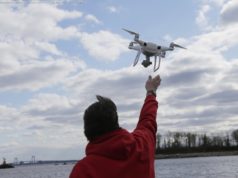Secretary of State Mike Pompeo told reporters traveling with him in Seoul that he was “confident” North Korea understood there will be in-depth verification of the dismantling of its nuclear program.
And he rejected widespread criticism of Trump’s announcement that the US is suspending military exercises with South Korea and Japan — a long-sought North Korean and Chinese goal that took the Seoul, Tokyo, US military officials and lawmakers by surprise.
“A lot has been made of the fact that the word ‘verifiable’ didn’t appear in the agreement,” Pompeo said of the joint statement. “Let me assure you that ‘complete’ encompasses ‘verifiable’ in the minds of everyone concerned. One can’t completely denuclearize without validating, authenticating — you pick the word. The President is committed to that.”
“It’s in the statement. It’s in the statement,” Pompeo insisted as he briefed reporters in Seoul. “You’re just wrong about that.”
The joint statement says that “President Trump committed to provide security guarantees to the DPRK, and Chairman Kim Jong Un reaffirmed his firm and unwavering commitment to complete denuclearization of the Korean Peninsula.”
Asked how “verifiable” and “irreversible” appeared in the statement, given that the words aren’t there, Pompeo said, “I suppose you could argue semantics, but let me assure you that it’s in the document.”
And then he added that, “I find that question insulting and ridiculous and frankly ludicrous,” adding that “one ought not play games with serious matters like this.”
Speaking of the North Koreans, Pompeo said he was “confident they understand that there will be in-depth verification.”
The top US diplomat was in South Korea to brief officials on the summit before traveling to China, where he will offer further briefings on the summit and regional issues with leaders there.
Pompeo defended Trump’s cancellation of military exercises, saying the commitment is they will be suspended as long as there are “productive, good-faith negotiations” ongoing.
Critics decried the move as offering up front a major concession. The military exercises are central to the security of US allies and crucial to maintaining the readiness and interoperability of forces. And the retreat of US military power in Asia is a long-held goal of Beijing, which is becoming increasingly assertive in the region.
Pompeo said the President he made clear the suspension would only last while good-faith talks were ongoing.
“He made very clear that the condition precedent for the exercises not to proceed was a productive, good-faith negotiations being ongoing and at the point it’s concluded that they’re not, the President’s commitment to not have those joint exercises take place will no longer be in effect,” Pompeo said.
It’s about “setting the right conditions for moving forward with those talks,” he said, declining to comment on why the President called them “provocative” — a term North Korea uses — or whether he or Trump consulted with US Forces Korea, the Pentagon, or the South Koreans on whether and how to take the step.
Pompeo also said he was very confident that “sometime in the next week or so we will begin the engagement” with North Korea, though he didn’t know the timing or how meetings would be structured. While the President is in charge, Pompeo said he will be the one “driving this process forward.”
Pompeo noted that “not all of that work” between the two negotiating teams “appeared in the final document,” but there were “lots of other places where there were understandings reached. We couldn’t reduce them to writing” and that this is where the teams will begin their work.
While he wouldn’t go into specific timelines, he said “absolutely” the administration wants major steps in the next two years. “Yes, we’re hopeful that we can achieve [major nuclear disarmament] in the next, what is it, two and a half years.”
“The modalities are beginning to develop,” Pompeo said, but said, “there will be a great deal of work to do.”
After Trump claimed yesterday that North Korea has destroyed test sites, Pompeo said, “I can only answer that we do have a reasonably good understanding of what took place there, but I don’t want to get into the intelligence assessment.”
He added that the US has spent “a reasonable amount of time developing our understanding of what took place there,” but added that “it’s always the case that our strong preference would be to have experts on the ground when these types of things take place. We can gain a much more thorough understanding of what actually occurred and what may not have.”






